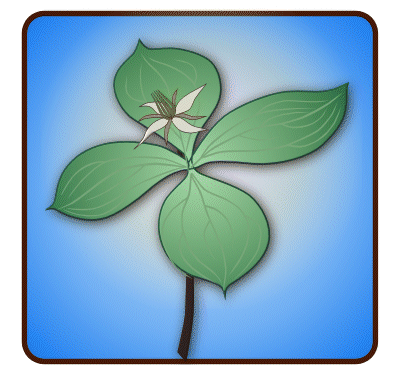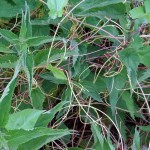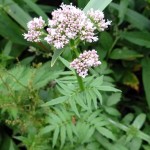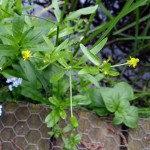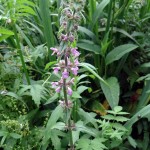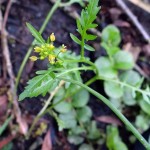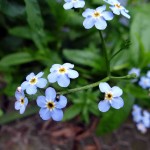Cleeve Water Meadows, near Streatley,are privately owned by Charlotte Turner. The management work being undertaken here is intended to restore the field to a water meadow, rich in wildflower species such as the Loddon Lily, Cuckooflower, Ragged Robin and Water Mint. Records show that the meadow used to be rich in wildflowers, but for a number of years it was not possible to carry out the work necessary to maintain it. Now, with the help of local conservation volunteers, together with funding from a Natural England Higher Level Stewardship agreement, the meadow is being brought back into the management regime needed to ensure its long-term future.
On Sunday 15 June, Charlotte kindly invited members from Reading and District Natural History Society, on a visit organised by Sheelagh Hill, to carry out a brief survey of the flora and fauna of the meadows. Although the findings were in no way comprehensive it was very encouraging to see a variety of the water meadow species returning. The most unusual discovery was Greater Dodder, in this case parasitising on nettles. It is found mostly in South east England and is categorised as rare. It likes wet areas and seems to grow alongside watercourses. Some of the other plants are less unusual, but are typical of water meadow habitats. They included Common Valerian, Marsh Woundwort, Common Meadow-rue, Celery-leaved Buttercup, Water Forget-me-not, Marsh Speedwell, Water Figwort, Fen Bedstraw and Marsh Yellow-cress.
One of the rarely seen insects, that was captured, was a Snakefly: http://en.wikipedia.org/wiki/Snakefly . This insect has an unusually long neck, which it can move like a snake and is predatory both as a larva and as an adult, on caterpillars, smaller insects etc.
Report by Chris Ash
Pictures by Chris Ash
| Bindweed | Convolvulus arvensis |
| Bramble | Rubus fruticosa |
| Bugle | Ajuga reptans |
| Celery-leaved Buttercup | Ranunculus sceleratus |
| Cleavers | Galium aparine |
| Common Gromwell | Lithospermum officinale |
| Common Meadow-rue | Thalictrum flavum |
| Common Valerian | Valeriana officinalis |
| Crack Willow | Salix fragilis |
| Creeping Jenny | Lysimachia nummularia |
| Creeping Thistle | Cirsium arvense |
| Curly Dock | Rumex crispus |
| Elder | Sambucus nigra |
| Enchanter’s Nightshade | Circaea lutetiana |
| Fen Bedstraw | Galium uliginosum |
| Feverfew | Tanacetum parthenium |
| Field Forget-me-not | Myosotis arvensis |
| Garlic Mustard | Alliaria petiolata |
| Great Water Dock | Rumex hydrolapathum |
| Great Willowherb | Epilobium hirsutum |
| Great Yellow-cress | Rorippa amphibia |
| Greater Dodder | Cuscuta europaea |
| Greater Plantain | Plantago major |
| Ground Elder | Aegopodium podagraria |
| Ground Ivy | Glechoma hederacea |
| Gypsywort | Lycopus europaeus |
| Hazel | Corylus avellana |
| Hedge Woundwort | Stachys sylvatica |
| Hemp Agrimony | Eupatorium cannabinum |
| Herb Robert | Geranium robertianum |
| Hornbeam | Carpinus betulus |
| Loddon Lily – leaves/seeds | Leucojum aestivum |
| Male Fern | Dryopteris filix-mas |
| Marsh Speedwell | Veronica scutellata |
| Marsh Woundwort | Stachys palustris |
| Meadow Buttercup | Ranunculus acris |
| Meadowsweet | Filipendula ulmaria |
| Mistletoe | Viscum album |
| Nipplewort | Lapsana communis |
| Orange Balsam | Impatiens capensis |
| Primrose | Primula vulgaris |
| Ragwort | Senecio jacobaea |
| Redcurrant | Ribes rubrum |
| Self Heal | Prunella vulgaris |
| Spindleberry | Euonymus europaeus |
| Stinging Nettle | Urtica dioica |
| Sweet Violet | Viola odorata |
| Teasel | Dipsacus fullonum |
| Thyme-leaved Speedwell | Veronica serpyllifolia |
| Water Figwort | Scrophularia |
| Water Forget-me-not | Myosotis scorpioides |
| Water Mint | Mentha aquatica |
| Wavy Bittercress | Cardamine flexuosa |
| White Dead-nettle | Lamium album |
| Wood Avens | Geum urbanum |
| Woody Nightshade | Solanum dulcamara |
| Yellow Flag | Iris pseudacorus |
| Blackcap | Sylvia atricapilla |
| Dunnock | Prunella modularis |
| Garden Warbler | Sylvia borin |
| Great Spotted Woodpecker | Dendrocopos major |
| Magpie | Pica pica |
| Harlequin Ladybird | Harmonia axyridis |
| Mute swan + 6 cygnets in pond | Cygnus olor |
| Red Kite | Milvus milvus |
| Sedge Warbler | Acrocephalus schoenobaenus |
| Peacock Caterpillars on nettles | Inachis io |
| Rathke’s Woodlouse | Trachelipus rathkii |
| Snake Fly | Raphidia notata |
Invertebrate records, identified by Keith Lugg:
| Species | Common name | Notes |
| Armadillidium vulgare | common pill woodlouse | |
| Gastrophysa viridula | Dock beetle | |
| Harmonia axydris | Harlrquin ladybird | |
| Trachelipus rathkii | woodlouse of flood meadows etc in south-East | |
| Trichoniscus pusillus agg | pygmy woodlouse | a male is needed to separate a species pair |
| Trichoniscus pygmeaus | no common name smaller than above | |
| Cylindroiulus caeruleocinctus | a millipede found mostly in the South-East | |
| Philoscia muscorum | Common Striped woodlouse | |
| Cionus scrophulariae | one of the Figwort weevils | |
| Ophyiulus pilosus | A common millipede | |
| Xanthostigma xanthostigma | snakefly | this one was a female |
| Cantharis pellucida | a soldier beetle | |
| Cantharis rufa | a soldier beetle | associated with marshes etc |
| Cantharis lateralis | a soldier beetle | associated with marshes etc |
| Pterostichus madidus | a ground beetle | |
| Loricera pilicornis | a ground beetle | found near the compost bins, feeds on springtails |
| Chrysolina polita | a leaf beetle | |
| Athous haemorrhoidalis | a click beetle | |
| Caspus ater | a mirid plant bug | |
| Stenodema laevigata | a grass bug | a species found in damper habitats than other grass bugs |
